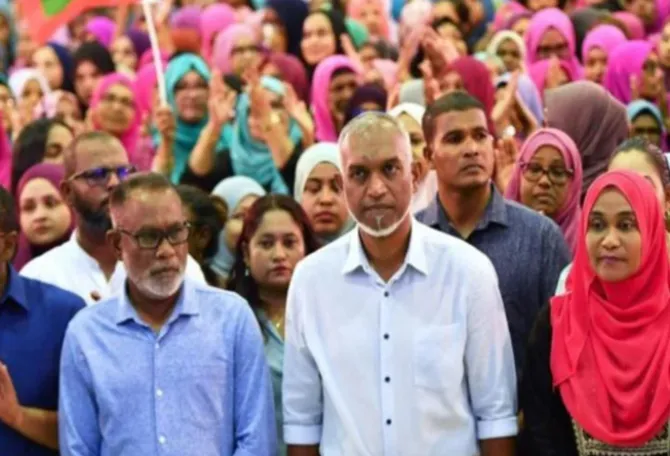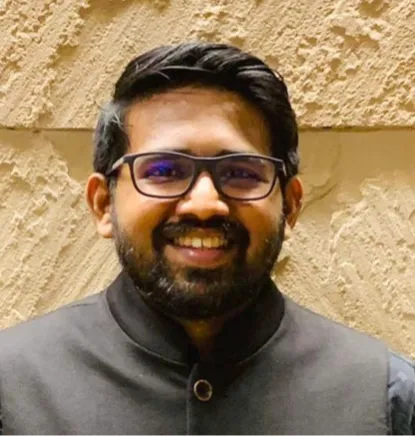
On 30 September 2023, Dr Mohamed Muizzu of the Progressive Alliance—a coalition of the Progressive Party of Maldives (PPM) and the People’s National Congress (PNC)—made history by defeating the incumbent President Ibrahim Solih of the Maldivian Democratic Party (MDP). With a mandate of 54 percent, Muizzu will now be the fourth elected president of the Maldives, epitomising the trend that the people in the country entrust responsibilities to a new president with each presidential election. As the president-elect prepares to swear in in November, political parties in the country are embracing new alliances, roles, and responsibilities. But with the parliamentary elections and a referendum approaching the island nation, its polity for the next five years is shrouded under uncertainty and unpredictability.
The current Maldivian polity
To start with, the victors of the 2023 elections comprise four different parties. First, PNC and PPM of the Progressive Alliance—both of these parties were led by former President Yameen. The PPM is still presided over by Yameen, while Muizzu won the presidential candidacy from the PNC and has been appointed as the president of that party. Two other partners, the Maldives National Party (MNP) and the Maldives Development Alliance (MDA), joined the alliance without any major conditions, after sensing that the PPM-PNC could win the second round of elections. As a result, the executive administration will be distributed among all four political parties with PPM-PNC having a lion's share. Some of the crucial policies of the administration are also likely to be consulted and discussed with Yameen, who has now shifted from prison to house arrest. Yameen will continue to maintain this status quo and authority over both of his parties as they are populated by his loyalists. However, this could brew into a power struggle when Muizzu begins to honour the classic Maldivian political tradition of offering crucial administrative positions to political appointees and personal loyalists. Muizzu also has a personal relationship with the hardline Jammiyatul Salaf (JS) and continues to enjoy their support. This increase in his popularity might create rifts and risks of instability in the alliance. Yameen’s complex history of cornering or plotting the arrests of his vice presidents when challenged further feeds into these concerns. Thus, one can anticipate two power centres and some rifts and struggles in the alliance in the near future. On the other hand, the incumbent government led by the MDP will now be playing the role of Opposition. By acknowledging his defeat, President Solih is determined to smoothly facilitate the power transition, unite and strengthen his party, and play the role of a responsible Opposition. The party continues to be relevant and politically powerful with its super majority status in the Parliament. The PPM-PNC coalition will not be the only party that the MDP will keenly scrutinise though. The MDP has also grown more determined and firmer on their stance vis-á-vis their estranged and separated faction, that later became the ‘Democrats’. After appeasing the Democrats by withdrawing a no-confidence motion against Speaker Nasheed and partially supporting the motion for the system change referendum, the MDP is now determined to keep that party at a distance. The MDP has not only decided to prevent Nasheed from re-entering the fold but has also opposed the need for a parliamentary system that the Democrats are rallying for. The third most relevant party—the Democrats—is portraying flexibility to entrench their relevance in the country’s current political landscape. In the aftermath of the primary round of elections, the party embraced neutrality and leveraged its third position to get the Parliament to pass a motion for a referendum on the parliamentary system. Following the election outcome, the party should have realised that a referendum can only be successful if it stays relevant in the current political landscape. So the party has explored ways to keep itself relevant—their leader Nasheed offered to rejoin the MDP, even as he expressed hopes in taking part in the new administration. While the MDP rejected his proposal, Nasheed has secured a role for his party in the incoming administration. He has likely preferred relevancy and power-sharing over the referendum by postponing the latter indefinitely and letting Muizzu “assemble his administration”. But, given the ideological differences between Nasheed and the rest of the PPM-PNC, it is likely that the newly established party is power-sharing to expand its presence to the grassroots, prepare for the upcoming parliamentary elections, and tactically hold the referendum.
Besides the Presidential elections, two other crucial developments will also shape the fate of the next five years in the country—the Parliamentary elections of 2024 and the referendum to change the country to a parliamentary democracy.
Other small political parties will also continue to play an important role. The old “kingmakers”, the Jumhooree Party (JP), have received a major blow with their electoral performance this year. As of now, the JP has continued to embrace a neutral policy and is committed to working on internal matters. The hardline Adhaalath Party (AP) still aligns with the MDP and hopes to act as Opposition. The MDP administration had offered the AP several crucial portfolios, but the party has zero seats in the Parliament. To complicate matters, by staying in the Opposition, the party will also be losing control of the Ministry of Islamic Affairs for the first time since the country’s democratic transition in 2008. The AP, today, are more at risk of losing their political ground in the country. Nonetheless, the roles of AP and JP are uncertain considering their history of acting as swing parties. Finally, the Maldives Third Way Democrats, founded after the fallout with PPM leadership, are likely to play a role in the Opposition and expand their voter base but are yet to contest in their first election.
One down, two more to go
Besides the Presidential elections, two other crucial developments will also shape the fate of the next five years in the country—the Parliamentary elections of 2024 and the referendum to change the country to a parliamentary democracy. The first crucial development would be the Parliamentary elections in 2024. The Maldivian Parliament currently comprises 87 MPs—56 from MDP, 13 from The Democrats, four each from PPM and PNC, three each from MNP and independent candidates, and two each from JP and MDA. Meaning, the PPM-PNC coalition with their two partners will have only 13 MPs. The lack of numbers will be a problem for Muizzu to pass or even mobilise support for his resolutions till the next parliamentary elections in 2024. This also underscores why PPM-PNC are discussing power-sharing with the Democrats. In the upcoming elections, the PPM-PNC government will desire a majority, as the lack of numbers might lead to a weak presidency and strong opposition, and increase the chances of political instability. But other parties are also keen to further their own interests with the parliamentary elections. The MDP will want to maintain a majority; the JP and AP will intend to stay relevant with a good electoral performance, considering their high political stakes; and the Democrats will look at this opportunity to expand their political presence. In the run-up to elections and their aftermath, parties will continue to form new fronts, roles, and alliances. While the issue has been debated since the country’s pre-transition period, the only party currently in favour of the referendum is the Democrats. The second crucial development is the referendum that was scheduled for October-end and is now postponed indefinitely. While the issue has been debated since the country’s pre-transition period, the only party currently in favour of the referendum is the Democrats. Other major parties have preferred a Presidential system, and the PPM-PNC coalition has not disclosed their stance. It is likely that with PPM-PNC and the Democrats needing each other in the interim, they have put the referendum on the backburner. However, the composition of the Parliament and the fate of political parties following the 2024 elections will determine the future of the referendum and the parties that advocate for it. As the new administration prepares to swear in in November, Muizzu will have to brace himself to make tactical alliances to cope with new challenges emanating from internal power struggles, parliamentary elections, and the calls for a referendum.
Aditya Gowdara Shivamurthy is an Associate Fellow with the Strategic Studies Programme at the Observer Research Foundation
The views expressed above belong to the author(s). ORF research and analyses now available on Telegram! Click here to access our curated content — blogs, longforms and interviews.




 PREV
PREV


